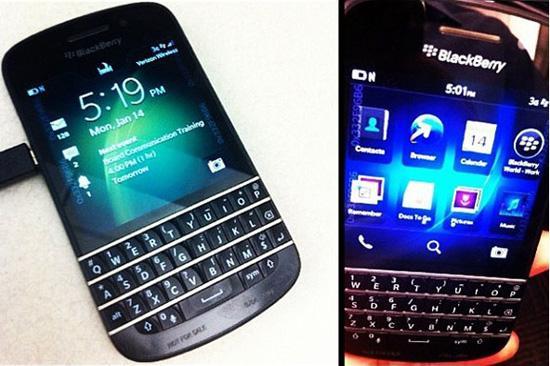
Are you excited about Research In Motion’s BlackBerry 10? I’m excited about BlackBerry 10. Among the competition, I think the Waterloo-based company’s new effort stands out, something that every designer wants in their designs. The sliding panels notwithstanding, RIM’s new mobile OS brings plenty of new ideas to the BlackBerry name, and it’s good that the company is taking such a big risk, especially in the face of so much adversity. The market is busy, and even getting overcrowded, but RIM’s plans still shine as a beacon of hope.
Is RIM still the underdog? Yes, especially if we’re just looking at the major companies at play within the mobile industry. Do they have a hard hill to climb to make any kind of impact? Absolutely. People are invested in not just phones, anymore, but also the ecosystems that come along with them, and that could very well play a role, even a negative one, for RIM’s future endeavors. Is it impossible for RIM to achieve what they’re setting out to do? Of course not. They may not have all the money, and even as much time as they’d like, but it’s not impossible.
That uphill battle isn’t just against the mobile industry’s biggest names, like Apple or Google, but it’s also apparently against people out there who get paid to “analyze” the industry as a whole. Now, I know a lot of analysts, and several of them I trust for their opinions. But it’s safe to say that some of them come up with some very, very interesting conclusions.
Most recently, an article published on Forbes by Sam Mattera for Benzinga Insights made me scratch my head in confusion a bit. In the report, Mattera suggests that RIM is building BlackBerry 10 not to necessarily succeed, but to use it as “a gambit intended to facilitate a sale of RIM.” Let’s let that sink in for a moment, before we press on.
Settled? Okay.
Mattera goes on to say that the BlackBerry London, that initial device we saw way back when, apparently spells doom for the company as a whole, because it doesn’t have the “characteristic keyboard, a feature which endeared the handset maker to many business professionals.” I feel like you may need a moment to remember that this analysis was published on January 21, 2013. This year. We’re talking about a device that we originally saw in 2011. On top of that, we’ve got a BlackBerry 10-based device that features a full hardware keyboard. Or, that “characteristic keyboard,” if you prefer.

The rest of the analysis goes over what we’ve heard in the past regarding RIM: Selling the hardware division proper, or licensing out the BlackBerry operating system to other manufacturers, of which he primarily names Samsung. (Fitting for those old rumors.)
So, I started thinking what this could mean, if there was any shred of truth into what was being analyzed. While I was contemplating the options, or just kicking around fun hypotheticals, another report landed on Bloomberg’s page, suggesting that Lenovo had been in contact with RIM at some point, to look at strategic options for both companies. Now, that doesn’t come as a surprise at all, as back in April of 2012 it became known that RIM was bringing in a financial advisor to look over RIM’s future business plans. To essentially weigh its options.
Indeed, RIM’s CEO Thorsten Heins has confirmed that he, and the company, is keeping all strategic options open. If it makes sense for RIM, it will be considered. That includes selling hardware production, or licensing the software. So, we can’t help but look at all these individual details, and try to complete a picture from the organized chaos.
Which is why I reached out to not only Ben Bajarin (@BenBajarin), Principal Industry Analyst for Consumer Technology at Creative Strategies, but also Avi Greengart (@greengart), Research Director for Consumer Devices at Current Analysis. I asked both men the same question: “What do you think the chances are that RIM is building BlackBerry 10 to facilitate a sale?”
Mr. Bajarin believes that it’s not likely that RIM is building BlackBerry 10 to facilitate a sale, but could be aiming to license the software. He points out that companies like Microsoft and Google, along with Samsung and their Tizen mobile OS, are looking to go “vertical” with their plans, and use their own software along with their own hardware. So, companies like HTC and LG, among others, need a “horizontal” mobile OS to choose from, something in addition to Android, since they do not make their own software.
“So if all these companies –Microsoft, Google, and Samsung—continue down a vertical path, what are the other companies like HTC, LG, ZTE, Huawei left to do? They need a horizontal OS offering since they don’t make the middleware.” Ben Bajarin.
Mr. Greengart, on the other hand, doesn’t believe that there’s any chance that Research In Motion is building BlackBerry 10 to offer any type of sale, or licensing deal. He believes that RIM is building BlackBerry 10 to succeed, to make its mark in the mobile industry again. However, he doesn’t discount the fact that it’s certainly possible that RIM doesn’t make it, and that they are forced at some point in the future to make a choice, where licensing BlackBerry 10 could be the only worthwhile option.
“Zero. That’s not to say RIM won’t be sold, but you don’t invest in getting a new platform off the ground if you’re trolling for a buyer.” Avi Greengart.
Both men agree that BlackBerry 10 will not speak for itself, in software alone. Bajarin and Greengart both point out that RIM’s hardware has to do just as much of the heavy lifting to show off what a new BlackBerry device can do. Yes, while eyes are certainly focused on the software, companies –like Lenovo—are going to be watching the hardware just as much, to see how it stands up against the competition.
(And, certainly, consumers will be taking note as to how the new BlackBerry 10 devices stack up against the high-end Android competitors, and especially the iPhone. RIM has to compete in a big way against Microsoft’s partnered hardware options, too.)
RIM has to show that the hardware is worth it to consumers, as well as developers, and potentially other companies who may look at strategic options with them in the future. It’s a juggling act, to be sure, but it’s one that can be handled if the focus is put on the right areas: hardware and software. Make it worthwhile for consumers to own, and developers to create for. (And, based on results from RIM’s recent developer initiative, they’re moving in the right direction.)
Is it impossible for RIM to succeed on their own? No, not at all. From what I’ve seen already, they’ve got the hard work aimed in the right direction, and there’s no denying that BlackBerry 10 certainly looks like a mobile operating system that can compete in today’s busy market. For consumers, though, hardware is just as important as software, so it will remain to be seen if the new BlackBerry 10-based devices can compete.
Does RIM stand a chance? Do you think RIM is aiming to sell itself, or even license its software, instead of make it on their own? Or is that hogwash? Let me know what you think!